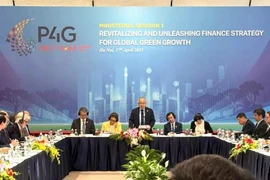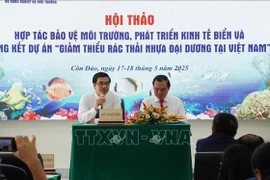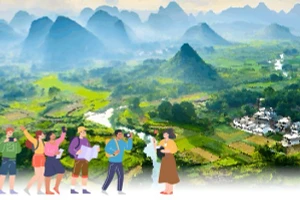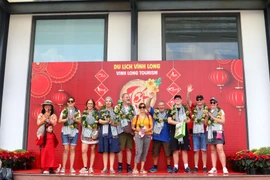Hanoi (VNA) – As the World Environment Day (June 5) spotlights the prevention of plastic pollution towards green lifestyle, circular economy, and sustainable future, Vietnamese communities are proving that meaningful change begins with individual action and collective determination.
In the northern coastal province of Quang Ninh, home to the UNESCO-recognised Ha Long Bay, a transformative revolution is unfolding as the Green Life Ha Long Cooperative developed into a network connecting farmers, schools, markets, and businesses. They adopt a three-step process that turns discarded materials like plastic bags, fabric scraps, and PVC banners to useful products such as bags, carpets, name tags and hair ties.
Director of the cooperative Tran Thi Huong said each product represents a rebirth, beginning with collecting plastic bottles, gathering fabric scraps, and composting organic waste. What appeared to be simple steps demanded tremendous efforts, meticulous attention, and unwavering dedication.
She shared that her vision goes far beyond production and it is about shifting mindset, transforming waste into resources, consumption habits into environmental actions, and each individual into part of the solution.
Green Life is envisaged to turn the model into an eco-tourism destination that includes recycling activities and green living practices. To deliver on the goal, Huong said, the cooperative needs support from competent authorities regarding the removal of barriers in land allocation, permits for tourists' overnight stays, and integration with existing tours.
Currently, it is operating an experience area where tourists could engage in classifying and recycling waste as well as crafting new products from discarded materials. The site draws up to 700 visitors a day, most of whom are international tourists.
According to Chief Executive Officer of the World Wide Fund for Nature (WWF) Vietnam Van Ngoc Thinh, over 11 million tonnes of plastic end up in the ocean each year, threatening biodiversity, food chain, and livelihoods of millions of people.
He called for responsible consumption, appropriate waste collection, sorting and recycling, as well as investment in education and communications, elaborating that raising public awareness is the key to behaviour change.
Quang Ninh province, boasting strong sea-based tourism and economy potential, has carried out multiple measures to change the behaviour of local residents and tourists regarding single-use plastics reduction.
In Ha Long Bay, waste collection, particularly floating foam buoys, has been maintained. Head of the Ha Long Bay Management Board Vu Kien Cuong said dedicated forces are regularly deployed to collect, transport, and handle waste while monitoring seawater environmental quality and promptly addressing pollution factors.
At the same time, the province has paid due attention to environmental protection in aquaculture—an important economic sector with more than 42,000 hectares of farming, including 10,200 hectares of mariculture.
The province has tackled a major pollution source by replacing cheap but environmentally destructive foam buoys with durable HDPE plastic alternatives. Since 2020, aquaculture operations have been transitioning to the long-lasting material that withstands storms without breaking apart and contaminating the marine ecosystem.
Minister of Agriculture and Environment Do Duc Duy said that the fight against plastic pollution could not succeed through isolated efforts. It must be a collective endeavour involving the entire political system, businesses, citizens, and the international community.
Duy called for beginning with the simplest changes, shifting consumer habits and adopting waste sorting, towards a country without plastic waste for future generations./.
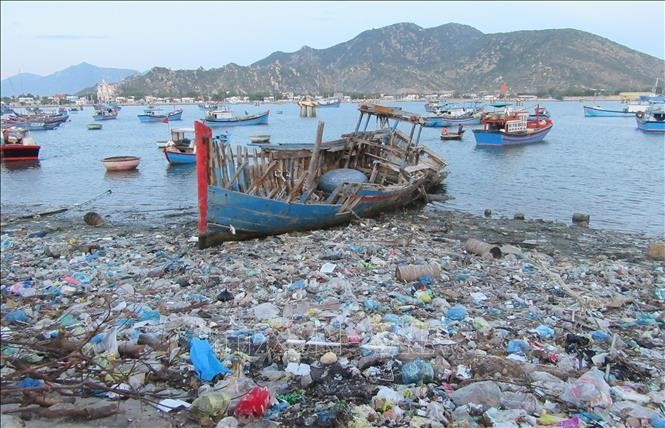
See more
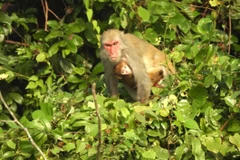
Wildlife conservation creates green livelihoods at Ben En National Park
Ben En National Park in the central province of Thanh Hoa has implemented a wide range of scientific studies and conservation projects aimed at safeguarding biodiversity, particularly rare and endangered wildlife species.
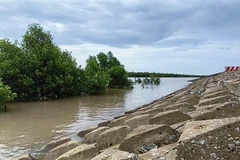
Ca Mau strives to put coastal, riverbank erosion under control by 2030
Solutions have been designed to suit local geological and hydrological conditions, combining traditional hard engineering works such as dykes and revetments with soft, nature-based and ecological solutions, including mangrove restoration.
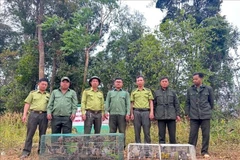
Lam Dong releases hundreds of wild animals back into the wild
According to the Ta Dung National Park Management Board, the park has for years served as a trusted destination for authorities and residents to hand over and release wildlife. Such actions not only contribute to biodiversity conservation but also help reduce illegal hunting and captivity of wild animals.

Hanoi pilots early air quality forecasting system
The system can forecast air quality trends over time and across locations, helping authorities guide and implement pollution control measures.
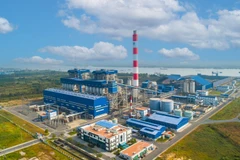
Recycling fly ash into valuable resource: sustainable path towards circular economy
The rate of fly ash utilisation has steadily increased over the years, to 84% in 2021 from 37.5% in 2018. During 2022–2023, many plants managed to consume 100% of the daily fly ash produced while also processing a significant portion of long-stored stockpiles.
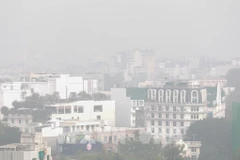
Hanoi targets 20% reduction in PM2.5 levels
Hanoi has affirmed its commitment not to trade environmental protection for economic growth. The city is moving to establish low-emission zones (LEZs) as a core measure to control emissions and promote green, sustainable urban development.
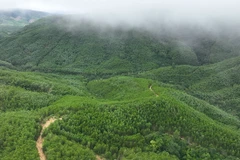
Forest protection, development stepped up from start of 2026
Localities are requested to encourage the participation of mass organisations, schools, businesses, armed forces and communities, while enhancing public responsibility for caring for and protecting trees after planting.
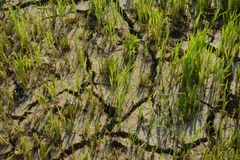
Vietnam takes actions to combat desertification, ensure sustainable land, resource management
Preventing and combating desertification is identified as a key task, helping with nature and biodiversity conservation, sustainable management of forests, water and land resources, and improvement of people's incomes and life quality.
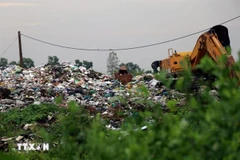
Ca Mau approves investment policy for waste-to-energy plant
The waste-to-energy plant is planned for construction in Dat Moi commune, covering a total area of about 20 hectares. It will have a waste treatment capacity of approximately 600 tonnes of household waste per day and a power generation capacity of 6MW.
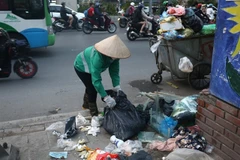
Hanoi to require household waste sorting, allow collectors to refuse unsorted trash
Under the new rules, household waste must be separated at source into recyclable materials, food waste and hazardous waste.
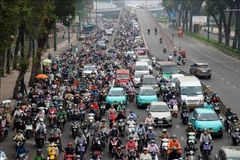
HCM City curbs pollution through transition to green transport
Together with metro expansion, HCM City will continue to enlarge its electric and green bus network, targeting a public transport share of 15–20% of travel demand.
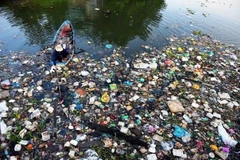
Plastic waste piles up as Vietnam struggles to curb culture of convenience
Vietnam produces nearly two million tonnes of plastic waste each year, most of it unrecycled. Interviews with young consumers and environmental experts reveal why regulation alone has struggled to curb a problem rooted in daily habits and low-cost plastic.
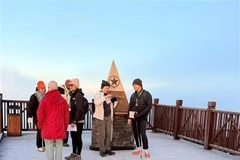
Peak Fansipan blanketed in ice on Christmas Day
With temperatures hovering between 1 and 3 degrees Celsius, frost and ice covered the summit area, creating an ideal condition for tourists eager to admire icy scenery, clouds and experience a Christmas atmosphere amid a sea of cold mist.
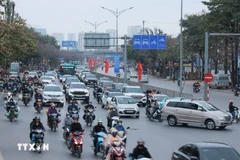
Vietnam targets vehicle emissions with stricter standards, digital enforcement
A substantial share of vehicles currently in use, especially motorcycles in use for years without routine checks or upkeep, are aging fleets that rank among the biggest emitters.
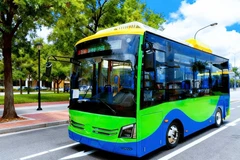
First public electric bus route in Con Dao Special Zone starts December 25
Electric bus Route No. 173 runs through 39 passenger pick-up and drop-off points, directly linking two locations with high travel demand — Con Dao Airport and Con Dao Market.
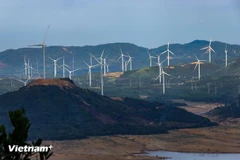
Nationwide mandatory management of emission quotas to be launched from 2028
Representatives of energy, coal – mineral, cement, and building materials enterprises said that the implementation of emission quota allocation must strike a balance between emission reduction targets and the maintenance of growth momentum.
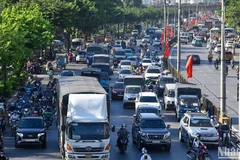
20 trailblazing companies in national green ESG rankings honoured
In 2025-2026, the “For a Green National Environment” programme will pivot around six tasks that merge expertise with broad social outreach, including targeted communications, "Journey to Net Zero" conferences and trainings, ESG surveys and announcements, a "National Green Ambassador" contest, a "Green Fashion" design competition, and the rollout of "National Green Station" models focused on zero-waste living.
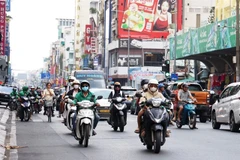
HCM City considers installing more air quality, subsidence monitoring stations
Under the proposed natural resources and environmental monitoring programme for next year, the city would operate 157 air quality monitoring points, 254 surface water monitoring points, 41 groundwater monitoring points, 54 soil monitoring points and 31 seawater quality monitoring points.
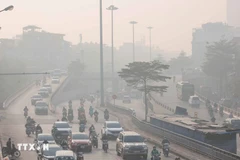
Hanoi to launch 5,000 public electric bicycles
In a move to reduce air pollution and promote green mobility, Hanoi has approved a plan to deploy 5,000 public electric bicycles, alongside restrictions on petrol- and diesel-powered vehicles in the city’s central area.

Natural disasters forecast to remain unpredictable next year
As of the end of last month, the East Sea had seen 15 typhoons and six tropical depressions, making it the year with the highest number of typhoons and tropical depressions on record, surpassing the previous record of 20 in 2017.

